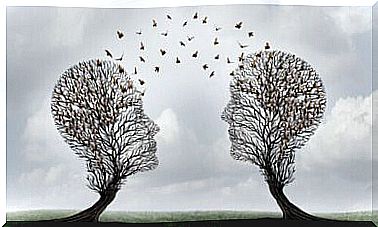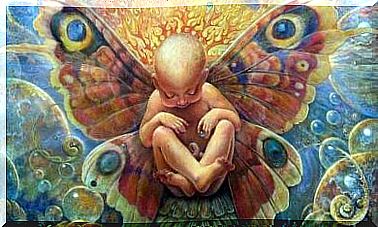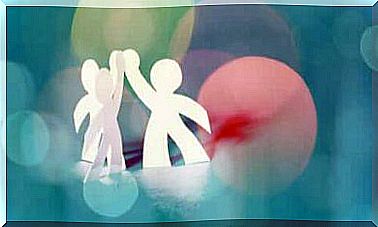Is It Really A Mistake To Trust Others Too Much?

Sometimes people accuse us of being overconfident. However, can we be punished and labeled as “naïve” for placing our trust in someone? Absolutely not, in any case. Because offering your trust and expecting it to be respected is not a mistake. The fault is on the one who lies, on the one who plays with the hearts of others and distorts the essential aspects of respect.
Lao-Tse said that those who do not trust enough are not trustworthy themselves. Somehow, whether we like it or not, people are “forced” to trust others in order to live together. Otherwise, we would live in environments characterized by constant anxiety. Otherwise, no one would dare, for example, to get behind the wheel of a car, board a means of public transport or leave children in schools under the responsibility of center staff.
Our culture and civilization base much of their social essence and dynamics on the principle of trust. We take it for granted on a daily basis to be able to live together, to reduce the feeling of fear and uncertainty in our relationships. After all, trust is that act of faith that we practice every day with our eyes closed, but with a receptive heart.
That’s why it can sometimes hurt a lot when someone accuses us of being overconfident after a bad experience. When we are told something like this, the suffering of our own disappointment is compounded by doubting whether we possibly have sinned by excess of naivety in this case … more careful?

Trust, the power of emotions
You could say that the word “trust” is one of the most beautiful words in existence. This term does not only define our ability to bond based on security and full affection in others. There is a principle in this term that pushes us to action, to action in which there is no fear, to which we dare to refer without discomfort or mistrust.
There is one fact which should attract our attention. As psychologist Joe Bavonese of the Relationship Institute in Royal Oak, Mich., Points out, people have become much more suspicious over the past decade.
This can be explained in particular by the progress of new technologies. Thanks to them, we have access to a large amount of information and it also gives us the chance to meet a lot more people. However, none of these dimensions are 100% reliable.
Likewise, it seems that living in a present so rooted in uncertainty (economic, social, political, etc.) also affects our relationships. We are perhaps a little more careful, a little more demanding. Nonetheless, there are still many who qualify some as overconfident. But… who are these people who sometimes have excessive trust in others?
Affective (or emotional) trust and cognitive trust
When we create bonds of trust, we do so through two very concrete dimensions:
- In the first place, there is emotional trust, which is nourished mainly on the emotional level: it is when we feel that this person or these people are worthy of confidence because our heart tells us so. Because we feel good around them. Or because the emotions they make us feel are of great value to us
- Cognitive confidence: in this case, judgments, thoughts and beliefs add to the emotional dimension. Thus, we carry out a series of assessments which will convince us in a perhaps more practical and objective way of why these people are trustworthy.
As a study by Jennifer Dunn of the University of California explains, when we are overconfident, we may be emotionally carried too far. Our judgments do not always adapt to reality, and we limit ourselves, perhaps, to listening to our emotions without sometimes being able to see or appreciate other more concrete signs.

Trusting others will never be a mistake, but when is it?
Trusting others will never be a mistake on our part. We cannot forget that our brain is a purely social organ intended to connect, to establish relationships and thus to guarantee our survival. Trust is a basic principle in human beings and therefore the experience of deception, betrayal or a lie is often experienced as something traumatic.
With that in mind, we still have to ask ourselves a question. In what situations might we still be characterized as overconfident? Here are a few examples.
When we ignore past experiences
Someone can disappoint us once or even twice. Now, if after several disappointments, complaints, bad times and bitterness, we continue to trust him, the mistake is ours.
Experience is always the best adviser. Therefore, no one can be ashamed of having made a mistake once. To live is also to fall, it is also to stumble and to leave your heart in the wrong hands. Now, after these situations, we have to do a good act of soul-searching and get some useful learning. It is not good for anyone to stumble over and over on the same rock.
When we forget that in relationships we have to be demanding
Being too sure of yourself sometimes means exposing yourself to unnecessary harm. It is never superfluous to apply a degree of excellence in relational matters and to dare to be gourmets in the choice of our friends and our romantic partners.
We must therefore remember which are the three indisputable principles of trust. The ones that no one should rape:
- Trust is knowing that we are worthy to receive support and help when we need it or when we ask for it.
- Trust is being able to share confidences without being judged or betrayed
- Finally, trust is knowing that the person we trust will do us no harm.
In conclusion, we all need to be able to trust someone. Without this daily support, life becomes hard and loses momentum… So let’s try to be good suppliers of this dimension with others, but also to be careful in the choice of pockets where to place this precious asset.










